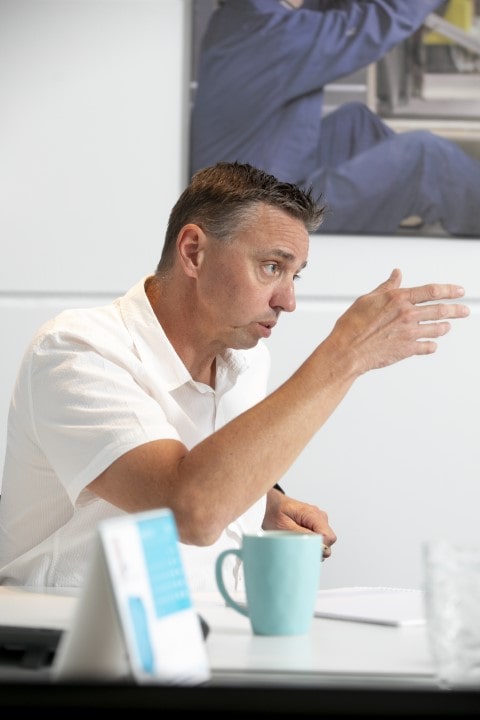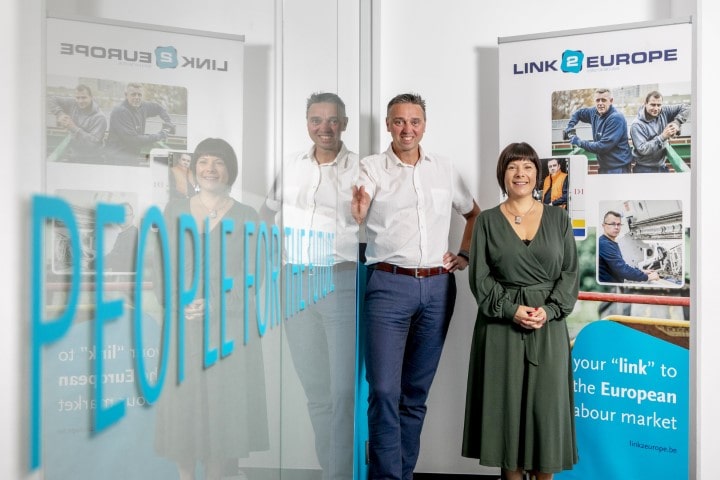Hiring a foreign worker to fill vacancies
Truck drivers, welders, construction workers and maintenance technicians, as well as machine operators or IT specialists: any Belgian company manager will agree that the labor market is almost fighting for these types of profiles these days. The number of candidates is low, demand is very high and this scarcity forces companies to take creative action. Because they can hardly fill their vacancies, more and more companies want to look across the border, towards Southern and Eastern Europe and even outside the EU for temporary work. Conversely, many candidates from abroad are eager to work for us. The reason is obvious: our wages are much higher than in the home country.

How to hire a foreign worker?
So there seems to be a fruitful relationship between supply and demand, but then practical concerns often throw a spanner in the works. Finding candidates in countries where you don't speak the language, for example, is no easy task. Moreover, there are a lot of practicalities: registering foreigners, helping them with housing, helping them get a bank account... Things that the average HR department does not know much about.
Igor Van Assche saw the gap in the market. In 2007, he founded Link2Europe, a recruitment company that works exclusively with foreign temporary workers for Belgian companies. "Since its inception, we are the only one exclusively serving this niche in the labor market," says Igor. "There are competitor companies that also provide foreign workers, but for us this is our core business. We also do not do secondment or subcontracting, we supply international personnel on a temporary basis or immediately through a permanent contract. Period." So hiring a foreign worker suddenly becomes a whole lot easier.
500 foreign workers per year
Link2Europe can currently temporary employment "draw" from just about every European country. In the seven main EU countries, the company has established partnerships with local recruitment agencies. The company brings about 500 foreign workers a year to Belgium. "The pure recruitment process is actually not that different from how it is done in our country," says Igor. "Candidates are screened based on competencies and qualifications in a personal interview. The real final selection - do we introduce someone to a particular company or not - happens in Belgium. What is completely different, though, is our service. We are actually much more than an employment or recruitment agency. At least half of our time and effort goes into supporting the people we bring here. From the moment candidates leave home, until they sign the contract, and even after that, we are there to support them."
That process begins even before they actually start working for their new employer. Igor: "Candidates are helped with the documents they need to apply for in their home country. The day before they start, we receive them in person at the office, go over their employment contract, make sure they have a bank account, that they are affiliated with a health insurance fund, that they have a social security number, that they are registered with the social security office... This is also necessary: due to the language law in our country, many legally required documents are only available in Dutch or French. Well, that doesn't help you much as a Pole or Bulgarian."
Housing foreign workers we also do
Even in housing, Igor and his colleagues have a finger in the pie. "For example, we have our own houses where people can stay before looking for their own housing. These are perfectly maintained homes, equipped with every comfort. And it goes even further: we provide transportation so they can get to work, we fill out all the paperwork for the municipality where they are going to live, and we help with their tax returns. For this, in turn, we work with specialized accounting firms who are familiar with foreign laws."
Help integrate
All that support is not unnecessary pampering, Igor stresses, but an expression of respect and warmth for the temporary worker. "Look, these people want to come and work here, they choose Belgium very consciously. They don't have to come and work here, they can work in France, the Netherlands, Great Britain, Germany, you name it. They often leave their families behind and find themselves in a completely different country, with a different culture and language. Usually they speak English or French, but Dutch almost never. I think it is only natural that we try to help and integrate them as much as possible. Wellbeing is one of our core values, which means we treat them with respect. By the way, we expect the same from the companies where they will be working."
Mutual respect

Usually that mutual respect is there, even if sometimes it goes by fits and starts, Igor admits. "Our customer has to be open to it, and we discuss that beforehand. But it sometimes happens, for example, that one of our employees ends up in a team full of Dutch speakers. Then, especially in the beginning, one has to have a bit of patience and empathy. Through very open and honest communication, both with the foreign temporary worker and with the Flemish colleagues, you usually get a long way. By the way: in the vast majority of cases, the people we bring here are very experienced workers who have mastered their job for years. They are not juniors who got out of school yesterday, so to speak. They have long since proven their skills in their home countries. Once people realize that here too, everything usually goes a lot smoother."
"By communicating very openly and honestly, both with the foreign worker and the Flemish colleagues, you usually get very far."
Foreign workers install winter and summer tires
Link2Europe brings to Belgium both people performing temporary contracts and permanent employees. "We also serve almost all sectors," says Igor. "We also specialized in skilled workers through temporary employment for a very long time, but since last year we can also supply highly skilled white-collar workers. The countries our people come from also fluctuate constantly. In the past, Poland, for example, was the number one spot. But now the country itself has become much more prosperous and Poles feel much less need to go abroad. They can more easily find work in their own country."
The reasons why companies call on Link2Europe's services can be simply summarized. "Either the companies cannot find the required competencies in their own country. Or they don't have the volumes to employ people permanently. Tire plants, for example, are a good example of that second situation. Tire plants have two huge peak times: when people change their summer to winter tires and vice versa. Two or three months then there is a huge amount of work, but because those periods are so short, it doesn't make economic sense to employ people permanently for that. Well, we have a whole contingent of foreign tire fitters who come here to help in the plants. They come to Belgium every year for a few months and when the work decreases, they return to their home country. Everyone happy."
Employees from outside the EU
Until last year, Link2Europe was mainly limited to recruiting people from the European Union. Due to the new single permit-legislation has made it much easier to employ candidates from outside the EU here as well. "That single permit has changed a lot for us," says Igor. "It used to take easily four to six months to complete all the paperwork for someone from outside the EU to work here. Now it's three to six weeks. We also feel that this benefits our companies. Textile workers, for example, are gradually becoming a dying breed in Europe, even in Eastern Europe. Sometimes certain countries are also very specialized in specific profiles. India, for example, is known for being able to provide good IT workers."
Foreign workers are good for our society
Finally, Link2Europe wants to make another case for opening the borders and welcoming foreign workers. "In the end, we all benefit from this, both foreigners and Belgians themselves. Because we bring foreign workers here, Belgian companies can produce and prosper. This is also good for the entire Belgian economy. Our people don't come here for stamp money or to 'to live on our hood. They work hard and pay every possible tax and duty here. And that ultimately benefits our whole society."
Based on the article that appeared in Fokus-online.
